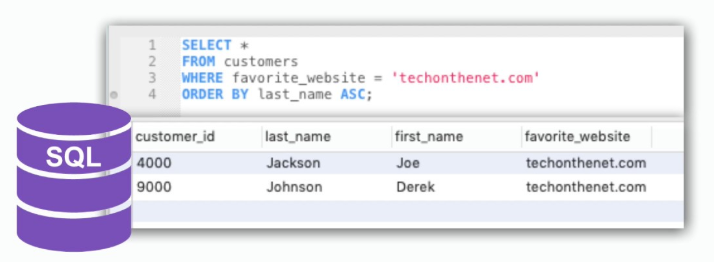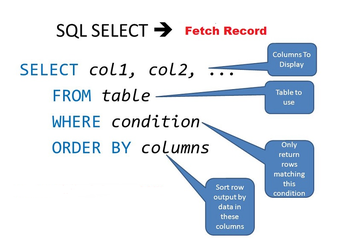Structured Query Language: Unterschied zwischen den Versionen
Aus wiki.bfw-kaufleute.de
Morapf (Diskussion | Beiträge) |
Morapf (Diskussion | Beiträge) |
||
| Zeile 25: | Zeile 25: | ||
=== Parameters or Arguments === | === Parameters or Arguments === | ||
| − | * '''expression''' | + | * '''expression''' <br>The columns or calculations that you wish to retrieve. Use * if you wish to select all columns.<br> |
| − | The columns or calculations that you wish to retrieve. Use * if you wish to select all columns.<br> | + | * '''tables''' <br>The tables that you wish to retrieve records from. There must be at least one table listed in the FROM clause.<br> |
| − | * '''tables''' | ||
| − | The tables that you wish to retrieve records from. There must be at least one table listed in the FROM clause.<br> | ||
* '''WHERE conditions''' | * '''WHERE conditions''' | ||
Version vom 22. Januar 2020, 14:17 Uhr
Structured Query Language, kurz SQL, ist eine Datenbanksprache zur Definition von Datenstrukturen in relationalen Datenbanken sowie zum Bearbeiten und Abfragen von darauf basierenden Datenbeständen.
Die SQL basiert auf der relationale Algebra, die Syntax ist einfach aufgebaut und semantisch an die englische Umgangssprache angelehnt.
Siehe https://de.wikipedia.org/wiki/SQL
Die Bezeichnung SQL leitet sich vom vorherigen Namen SEQUEL ab. Eine Namensänderung der Datenbanksprache wurde notwendig, da der Begriff SEQUEL von einer anderen Firma zuvor patentiert worden war.
Sprachelemente[Bearbeiten]
- Data Manipulating Language (DML): Befehle zur Datenmanipulation wie Löschen, Ändern, Hinzufügen und lesendem Zugriff
- Data Query Language (DQL): Befehle zur Abfrage und Aufbereitung der gesuchten Informationen; Klassifizierung als Untermenge der DML
- Data Definition Language (DDL): Befehle zur Datenbankschemadefinition
- Data Control Language (DCL): Befehle für die Rechteverwaltung und Transaktionskontrolle
Syntax[Bearbeiten]
The syntax for the SELECT statement in SQL is:
SELECT expressions
FROM tables
WHERE conditions
[ORDER BY expression [ ASC | DESC ]];
Parameters or Arguments[Bearbeiten]
- expression
The columns or calculations that you wish to retrieve. Use * if you wish to select all columns. - tables
The tables that you wish to retrieve records from. There must be at least one table listed in the FROM clause.
- WHERE conditions
Optional. The conditions that must be met for the records to be selected. If no conditions are provided, then all records will be selected.
- ORDER BY expression
Optional. The expression used to sort the records in the result set. If more than one expression is provided, the values should be comma separated.
- ASC
Optional. ASC sorts the result set in ascending order by expression. This is the default behavior, if no modifier is provider.
- DESC
Optional. DESC sorts the result set in descending order by expression.


